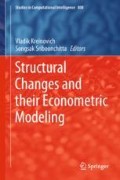Abstract
Nowadays, information and communication technologies are widely used in Thailand. Also, the government has a policy to support economic development through ICT, expecting to help increase the growth of Thai economy. The research purpose is to study the impact of ICT on Thai economic trends. The researchers use ICT data which includes values of communications, computers, information, and other services covering international telecommunications and computer data from 1976 to 2017, to estimate ICT parameter with the Bayesian linear regression approach. All of parameters used in the DSGE model are to predict the effects of ICT on some parts of Thai economic sectors. The estimated result shows that ICT investment can positively contribute to an increase of consumption and future investment. Therefore, ICT investment is beneficial to Thai economic trends in positive ways.
Access this chapter
Tax calculation will be finalised at checkout
Purchases are for personal use only
References
Gupta, B., Dasgupta, S., Gupta, A.: Adoption of ICT in a government organization in a developing country: an empirical study. J. Strat. Inf. Syst. 17(2), 140–154 (2008)
van Ark, B., Inclaar, R., McGuckin, R., Timmer, M.P.: The Employment Effects of the “New Economy”: A Comparison of the European Union and the United States. University of Groningen and The Conference Board, March 2003 (2003)
Berkhout, F., Hertin, J.: Impacts of information and communication technologies on environmental sustainability: speculations and evidence. Draft Report to OECD Directorate for Science Technology and Industry. Organization for Economic Cooperation and Development, Brighton (2001)
Bertot, J., Jaeger, P., Grimes, J.: Using ICTS to create a culture of transparency: e-government and social media as openness and anti-corruption tools for societies. Gov. Inf. Q. 27(3), 264–271 (2010)
Chakpitak, N., Maneejuk, P., Chanaim, S., Sriboonchitta, S.: Thailand in the era of digital economy: how does digital technology promote economic growth? In: International Conference of the Thailand Econometrics Society, pp. 350–362. Springer, Cham (2018)
Chourabi, H., Nam, T., Walker, S., Gil-García, J.R., Mellouli, S., Nahon, K., Pardo, T.A.: Understanding smart cities: an integrative framework. In: Scholl, H.J. (ed.) Proceeding of HICSS, pp. 2289–2297 (2012)
Smets, F., Wouters, R.: An estimated dynamic stochastic general equilibrium model of the euro area. J. Eur. Econ. Assoc. 1(5), 1123–1175 (2003)
Gichoya, D.: Factors affecting the successful implementation of ICT projects in government. Electron. J. e-Gov. 3(4), 175–184 (2005)
Klima, G., Podemski, K., Retkiewicz-Wijtiwiak, K.: General equilibrium economic modeling language and solution framework. Republic of Poland, WARSAW (2014)
Yovanof, G.S., Hazapis, G.N.: An architectural framework and enabling wireless technologies for digital cities & intelligent urban environments. Wirel. Pers. Commun. 49(3), 445–463 (2009)
Wang, H.:. ICT and economic development in Taiwan: analysis of the evidence. J. Telecommun. Policy 23(1), 235–243 (1999). http://www.sciencedirect.com. Accessed 25 Mar 2017
Ishida, H.: The effect of ICT development on economic growth and energy consumption in Japan. Telemat. Inform. 32, 79–88 (2015)
Becchetti, L., Bedoya, D., Paganetto, L.: ICT Investment, productivity and efficiency: evidence at firm level using a stochastic frontier approach. J. Prod. Anal. 20(1), 143–167 (2003). https://link.springer.com. Accessed 25 Mar 2017
Kamel, S., Rateb, D., El-Tawil, M.: The impact of ICT investments on economic development in Egypt. Electron. J. Inf. Syst. Dev. Ctries. 36(1), 1–21 (2009)
Ministry of Digital Economy and Society. Bandua digital economy. Retrieved from Ministry of Digital Economy and Society (MDES). http://www.mdes.go.th/view/1/
Sadorsky, P.: Information communication technology and electricity consumption in emerging economies. Energy Policy 48(1), 130–136 (2012)
Pravit Khamanan and Katanee Thanya prasert: A study of the relationship between productivity growth and the type of innovation: case study of manufacturing sector in Thailand. J. Econ. Thammasat Univ. 29(1), 1–47 (2010)
Sbordone, A.M., Tambalotti, A., Krishna, R., Walsh, K.: Policy analysis using DSGE models: an introduction. FRBNY Econ. Policy Rev. 16(2), 23–43 (2010)
Perminov, S., Egorova, E.: ICT Impact on Labor Productivity and Employment in Russia (2005). http://tiger.edu.pl/publikacje/TWPNo73. Accessed 25 Mar 2015
Shiraz, F., Ngwenyama, O., Morawczynski, O.: ICT expansion and the digital divide in democratic freedoms: an analysis of the impact of ICT expansion, education and ICT filtering on democracy. Telemat. Inform. 27(1), 21–31 (2010)
Toffel, M.W., Horvath, A.: Environmental implications of wireless technologies: news delivery and business meetings. Environ. Sci. Technol. 38(11), 2961–2970 (2004)
Walter, G., Augustin, T.: Bayesian linear regression – different conjugate models and their (in)sensitivity to prior-data conflict. Technical report Number 069, Department of Statistics, University of Munich (2009)
Author information
Authors and Affiliations
Corresponding author
Editor information
Editors and Affiliations
Rights and permissions
Copyright information
© 2019 Springer Nature Switzerland AG
About this paper
Cite this paper
Klinlampu, C., Chaiboonsri, C., Saosaovaphak, A., Sirisrisakulchai, J. (2019). An Analysis of the Impact of the Digital Economy on Change in Thailand’s Economic Trends Using Dynamic Stochastic General Equilibrium (DSGE). In: Kreinovich, V., Sriboonchitta, S. (eds) Structural Changes and their Econometric Modeling. TES 2019. Studies in Computational Intelligence, vol 808. Springer, Cham. https://doi.org/10.1007/978-3-030-04263-9_33
Download citation
DOI: https://doi.org/10.1007/978-3-030-04263-9_33
Published:
Publisher Name: Springer, Cham
Print ISBN: 978-3-030-04262-2
Online ISBN: 978-3-030-04263-9
eBook Packages: Intelligent Technologies and RoboticsIntelligent Technologies and Robotics (R0)

